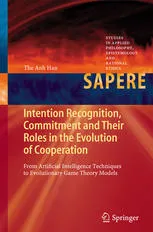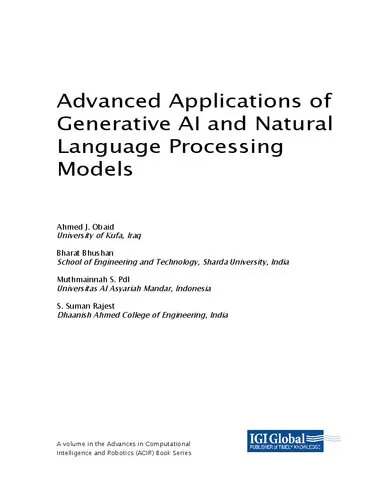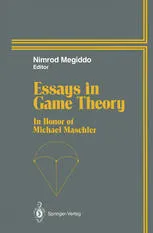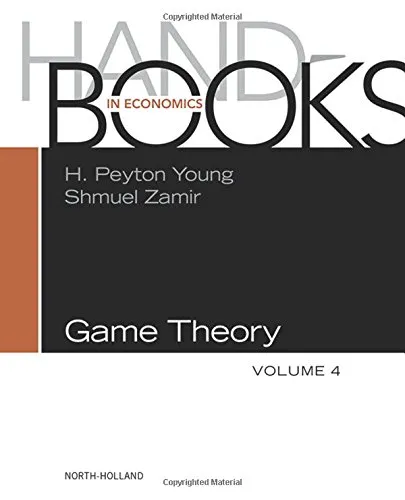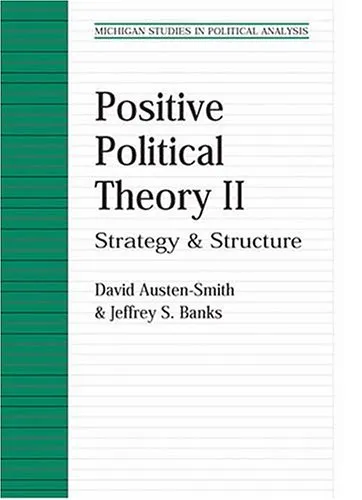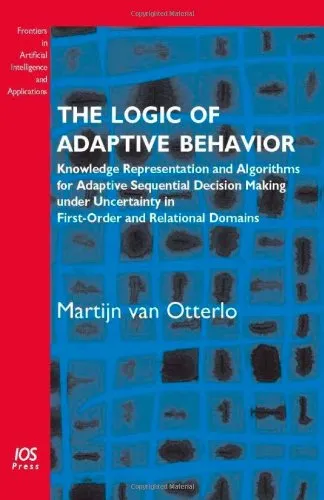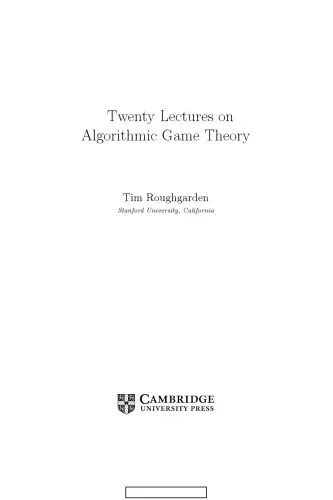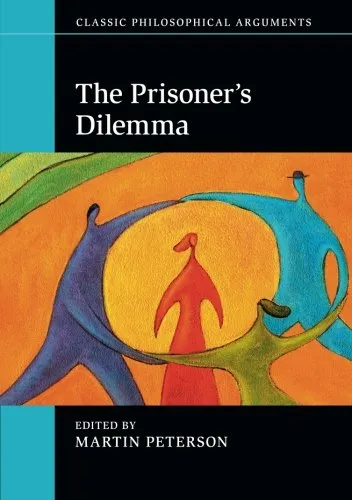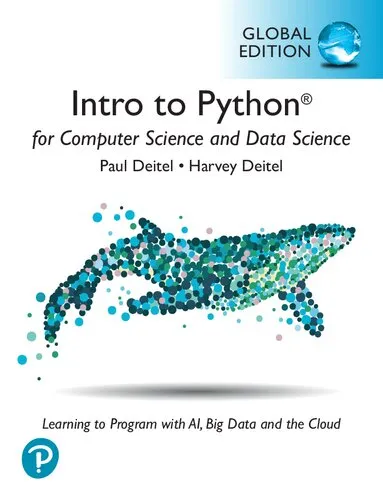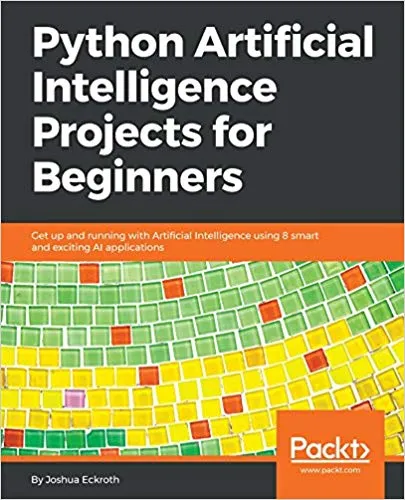Intention Recognition, Commitment and Their Roles in the Evolution of Cooperation: From Artificial Intelligence Techniques to Evolutionary Game Theory Models
4.5
بر اساس نظر کاربران

شما میتونید سوالاتتون در باره کتاب رو از هوش مصنوعیش بعد از ورود بپرسید
هر دانلود یا پرسش از هوش مصنوعی 2 امتیاز لازم دارد، برای بدست آوردن امتیاز رایگان، به صفحه ی راهنمای امتیازات سر بزنید و یک سری کار ارزشمند انجام بدینکتاب های مرتبط:
معرفی کتاب
کتاب "Intention Recognition, Commitment and Their Roles in the Evolution of Cooperation: From Artificial Intelligence Techniques to Evolutionary Game Theory Models"، اثری جامع و منحصر به فرد است که توسط من، The Anh Han، نوشته شده است. این کتاب به بررسی تأثیرات شناسایی نیت (Intention Recognition) و تعهد (Commitment) در شکلگیری و پیشرفت همکاری میپردازد. با ترکیبی از تکنیکهای هوش مصنوعی (Artificial Intelligence) و نظریه بازیهای تکاملی (Evolutionary Game Theory Models)، کتاب ابزاری کارآمد برای درک ساختار روابط اجتماعی پیچیده ارائه میدهد.
خلاصه مفصل کتاب
در این کتاب، ما به مسئلهای بنیادی پرداختهایم: "چگونه همکاری در میان عوامل خودمختار، که هدفشان بهینهسازی منافع شخصی خود است، شکل میگیرد؟" این سؤال در بسیاری از رشتهها از جمله زیستشناسی، علوم اجتماعی و هوش مصنوعی از اهمیت اساسی برخوردار است. کتاب در سه بخش کلیدی تنظیم شده است:
- اول، شناسایی نیت با استفاده از تکنیکهای پیشرفته در هوش مصنوعی و یادگیری ماشین بررسی میشود. این بخش به نحوه شناسایی مقاصد دیگران و چگونگی تأثیرگذاری آن بر همکاری میپردازد.
- دوم، مفهوم تعهد بهعنوان یکی از ابزارهای اصلی در ارتقای همکاری در محیطهای بازی مورد مطالعه قرار گرفته است.
- سوم، کاربرد نظریه بازیهای تکاملی برای مدلسازی این مفاهیم مورد بحث قرار گرفته و مفاهیمی نظیر Stable State و dynamics evolutionally بهطور مفصل بسط داده میشوند.
این کتاب، تحقیقات میانرشتهای زیادی را به تصویر میکشد و بهواسطه بهرهمندی از رویکردهای نظری و کاربردی، به خوانندگان کمک میکند تا درکی عمیقتر از مکانیسمهای همکاری داشته باشند.
نکات برجسته کتاب
- رویکرد میانرشتهای شامل هوش مصنوعی، علوم شناختی و نظریه بازیهای تکاملی.
- تکنیکهای نوآورانه برای شناسایی نیت در سامانههای چندعاملی.
- اهمیت مفهوم تعهد در پشتیبانی از همکاریهای طولانیمدت.
- تحلیلهای دقیق از مدلهای ریاضی برای توضیح پدیدههای واقعی همکاری.
- مطالعات موردی متعدد و برنامههای عملی برای سیستمهای تکنولوژی محور.
جملات معروف از کتاب
"Cooperation is not a mystery; it is a delicate dance of intentions and commitments established over countless interactions."
"The success of cooperation lies in our ability to recognize and predict intention."
چرا این کتاب اهمیت دارد؟
در دنیای مدرن، که تکنولوژی و ارتباطات اجتماعی در تعاملهای روزمره نقش اصلی را بازی میکنند، درک نحوه ایجاد همکاری و پایداری آن اهمیت فزایندهای پیدا کرده است. این کتاب با ادغام نظریهها و مدلهای پیشرفته، چراغی جدید بر روی مباحث عمیق اجتماعی و علمی میتاباند. مهندسان، محققان، و علاقهمندان به علوم اجتماعی و کامپیوتر میتوانند از این اثر برای گسترش دانش و بهبود ابزارهای خود بهره بگیرند. در نهایت، این کتاب نهتنها مبانی نوینی را درباره همکاری در سیستمهای پیچیده ارائه میکند، بلکه الهامبخش پژوهشهای آتی نیز خواهد بود.
Introduction
The book “Intention Recognition, Commitment and Their Roles in the Evolution of Cooperation: From Artificial Intelligence Techniques to Evolutionary Game Theory Models” offers an interdisciplinary examination of how humans, animals, and artificial systems learn to collaborate by leveraging concepts such as intention recognition and commitment. Through this lens, the book bridges the gap between artificial intelligence, cognitive sciences, and evolutionary game theory to address a fundamental question: How and why does cooperation evolve?
The exploration of cooperation in complex systems remains a cornerstone of scientific inquiry, cutting across fields like ethics, social psychology, biology, and computation. In this book, I discuss how understanding intention recognition mechanisms and commitment strategies provides new insights into the evolution and sustainability of cooperation. With a combination of theoretical modeling, simulations, and data analysis, the book offers readers a deeper understanding of these essential facets of intelligent behaviors in diverse settings, from biological ecosystems to machine learning algorithms.
Detailed Summary of the Book
The book is structured around three interconnected themes: the dynamics of intention recognition, the role of commitment, and their combined importance in fostering cooperation.
Part I: Foundations
In the initial chapters, foundational concepts are addressed, starting with definitions of key terms such as cooperation, intentions, and commitments. Drawing from cognitive science, the book delves into how individuals infer the intentions of others in both human and artificial systems. A direct linkage is made to artificial intelligence, where computational methods like probabilistic reasoning and machine learning help predict and identify intentions.
Part II: Evolutionary Game Theory
The core of the book investigates how these cognitive capacities are contextualized within evolutionary game theory. Models like the Prisoner’s Dilemma, Stag Hunt, and trust games are extensively analyzed to understand how commitment strategies—formal agreements, direct reciprocity, or implicit promises—reinforce cooperation under uncertain conditions. The chapters outline mathematical and computational experiments demonstrating when intention recognition aids cooperation and when it may break down.
Part III: Applications and Implications
The book concludes with applications in both artificial systems and human societies. Practical examples range from improving collaborative AI systems to policymaking for sustainable human cooperation in global issues such as climate change and resource-sharing. A significant discussion is devoted to the moral and ethical dimensions of deploying intention recognition in AI systems, such as transparency and fairness.
Key Takeaways
- Understanding and recognizing others' intentions improve cooperative dynamics, both in biological systems and artificial agents.
- Commitment is a vital cornerstone in fostering sustainable cooperation, ensuring stability in interactions even under uncertainty.
- Evolutionary dynamics reveal the conditions where cooperative strategies are advantageous and the mechanisms that break them down, fostering a deeper understanding of human and AI behavior.
- AI technologies provide unprecedented opportunities for modeling and enhancing cooperation but must be deployed ethically and transparently.
Famous Quotes from the Book
“In recognizing the intentions of others, we unlock the potential to cooperate, to build, and ultimately to thrive as a society or system.”
“Commitment transforms ephemeral interactions into lasting bonds that underpin cooperation across generations or iterations.”
Why This Book Matters
This book is significant for multiple audiences, including researchers in artificial intelligence, behavioral economists, and evolutionary biologists. Its ability to synthesize complex topics such as intention recognition and evolutionary game theory provides valuable insights into cooperation—a phenomenon central to both natural and artificial systems. As humanity increasingly interacts with intelligent machines in a wide range of fields, understanding cooperation principles becomes more crucial than ever. Offering fresh perspectives, this book not only outlines theoretical insights but also makes concrete proposals for applying these ideas in real-world scenarios.
Furthermore, given the rise of ethical concerns about deploying intelligent agents that mimic human behavior, it opens up crucial discussions about ensuring fairness and sustainability in such applications. Its multidisciplinary approach makes it a cutting-edge resource for students, professionals, and academics looking to contribute to advancements in their respective fields.
دانلود رایگان مستقیم
شما میتونید سوالاتتون در باره کتاب رو از هوش مصنوعیش بعد از ورود بپرسید
دسترسی به کتابها از طریق پلتفرمهای قانونی و کتابخانههای عمومی نه تنها از حقوق نویسندگان و ناشران حمایت میکند، بلکه به پایداری فرهنگ کتابخوانی نیز کمک میرساند. پیش از دانلود، لحظهای به بررسی این گزینهها فکر کنید.
این کتاب رو در پلتفرم های دیگه ببینید
WorldCat به شما کمک میکنه تا کتاب ها رو در کتابخانه های سراسر دنیا پیدا کنید
امتیازها، نظرات تخصصی و صحبت ها درباره کتاب را در Goodreads ببینید
کتابهای کمیاب یا دست دوم را در AbeBooks پیدا کنید و بخرید
1294
بازدید4.5
امتیاز0
نظر98%
رضایتنظرات:
4.5
بر اساس 0 نظر کاربران
Questions & Answers
Ask questions about this book or help others by answering
No questions yet. Be the first to ask!
